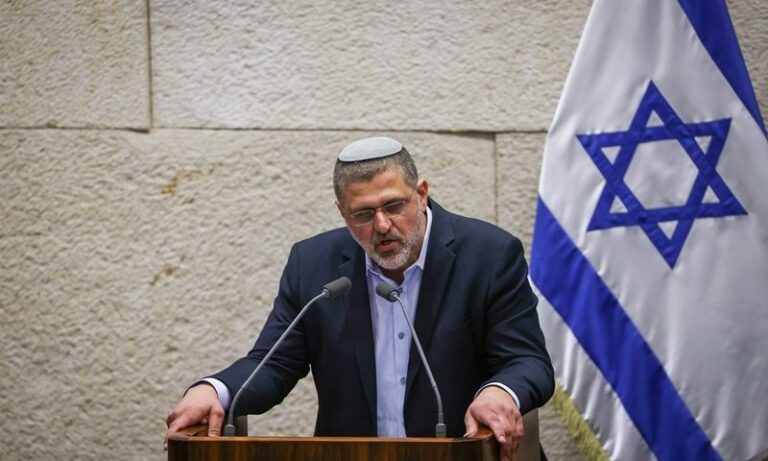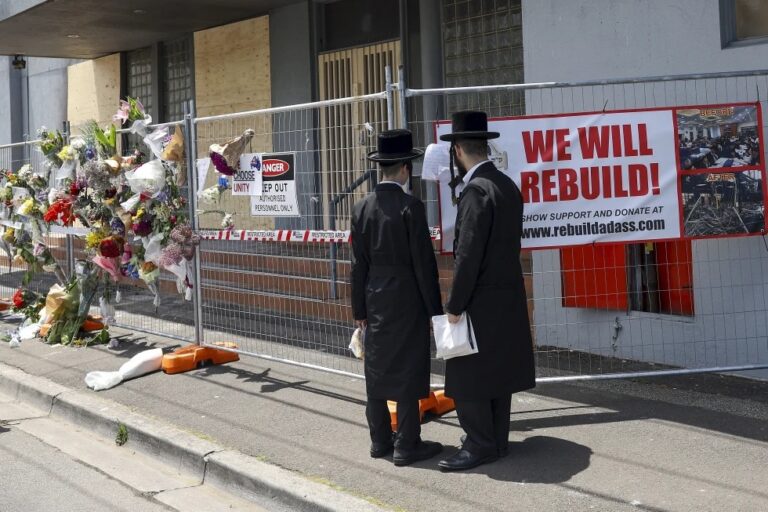by Rabbi Yair Hoffman
This article was written l’ilui nishmas (for the elevation of the soul ofl) the author’s mother, Sarah bas HaRav Eliyahu, whose seventeenth yartzeit is tonight, 22 Av.
It is the custom within the community, Klal Yisroel, to light a Yahrzeit candle on the day that a relative had passed away. This article will discuss the reasons for it, but first – a tefillah:
The lighting has no accompanying blessing, and I am sure that many people find themselves looking for something appropriate, some way to express themselves in a prayer when lighting the candle. This is not only true on a Yahrzeit but whenever Yom Tov comes as well and Yizkor is said.
The author of the Peleh Yoetz, Rabbi Eliezer Papo (1785–1828), did in fact compose such a prayer. Rav Papo was the Rabbi of the city of Selestria in Bulgaria. Bulgaria was a part of the Ottoman Empire at the time. The Tefillah of the Pelehe Yoetz is reproduced in Hebrew and translated below, as a public service.
הריני מדליק נר זה למנוחת ולעילוי נשמת אבי מורי (אמי מורתי) ____ בן ____
תפילה הנמצאת בספר אלף המגן מבעל הפלא יועץ על פרשת ויצא עמוד כ”ד
יהי רצון מלפניך ה’ אלקינו ואלקי אבותינו, שתקבל ברחמים וברצון כל מעשה הטוב שאני עושה, בין במחשבה, בין בדיבור, בין במעשה ויהיה הכל לזכות ולמנוחת ולעילוי לנשמות עמך ישראל, ובפרט לנפש רוח של (אמי/אבי/נפטר) _____. יהי רצון שתהיינה נפשותיהם צרורות בצרור החיים.
Behold I am lighting this lamp for the rest and uplifting of the soul of my father (or deceased), my teacher _______ the son of _______.
May it be Your will before you, Hashem our G-d and the G-d of our forefathers, that all my good deeds whether in thought, speech or action be done for a merit and a resting and an elevation of the souls of your nation Israel. It should be especially for the soul of my mother/father/ deceased _____. May it be Your will that their souls be bound in the bond of life.
THE REASONS
Please note that much of the information below is found in Rav Aharon Levine’s wonderful sefer called “Kol Bo L’Yartzeit (Vol. I Chap. 1).”
• It is a fulfillment of the Mitzvah of V’ahavta l’rayacha kamocha. Rav Yitzchok Isaac Sherr zatzal Leket Sichos Mussar (p 329) cites three sources for the application of this Mitzvah to parents. The Zohar (Raya Mehemnusa Dvarim page 281a) writes that we are obligated to love our parents as we do ourselves, for their love is equated to the love of Hashem. The Sefer Chareidim 9:37 writes that loving them is part of the Mitzvah of honoring them. The Chayei Odom 67:1 also writes that we are obligated in loving them. The matter is of some debate, however, as the Maharal in his Chidusshei Agados 31a seems to be of the opinion that there is no greater obligation to love parents more so than other Jews.
• It is a fulfillment of Kivud Av v’aim. The Gemorah Kiddushin 31b explains that the Rabbis taught- You honor him in his lifetime and you honor him after death. Both Dayan Weiss (Minchas Yitzchok Vol. III #136:9) and the Tzitz Eliezer (Vol XII 59:3) are of the opinion that Kivud Av v’Aim after death is also biblical.
• It is an obligation of Hakaras HaTov – recognizing the good that one had received from another. This is particularly true that we should recognize all that parents have done for us on a day that we have the ability to give merit to their neshama and assist in their receiving greater reward.
• It brings a Kapparah, an atonement for the Neshamos. The Arizal in his Shaar HaKavanos writes that the Neshama’s record is reviewed on the day of the Yarhrtzeit. Thus when the children do maasim tovim, learn Torah, say kaddish and do other Mitzvos, this atones for anything the Neshamah might have done.
• It brings an elevation for the Neshama. Even if the Neshama was free of sin, there are different aspects of performances of Mitzvos that are taken into account when the Neshama reaches the upper realms. Observance of the Yahrtzeit assists in elevating the Neshama [See Panim Yafos on B’haaloscha “Kach es hal’viim].
• It is a fulfillment of Hashavas Aveidah. The Gemorah in Sanhedrin explains that saving one’s life is a fulfillment of returning a lost object. Certainly this would be so in regard to restoring the soul to a loftier level.
• It avoids violating Lo Saamod al Dam Rayacha. The Torah tells us not to stand idly by one’s brother’s blood. If we just ignore an opportunity to place a parent on a higher spiritual level – this is tantamount to standing idly by another’s blood.
• It is the fulfillment of the obligation to perform Chessed. The greatest Chessed is the one that is done to someone that cannot return the favor. Those that are the shochnei afar – cannot repay anyone. Observing a Yahrtzeit is thus one of the greatest Chassadim.
• It counteracts the Raya Mazlei of the Neshama. When a Neshama ultimately passes away, there is a Raya Mazlei aspect to him. Although we say Ain mazal l’yisroel – at times there are elements that effect the mazal too according to some Rishonim. Observing the Yahrtzeit through the act of free choice of his descendents – counters that force.
• It is proper to be pained on that day. This is the day that we have lost a parent. It is wrong not to feel pain on that day.
• It commemorates the day of one’s loss. Only when we truly know the pain of losing something do we truly appreciate the value of what we have. We can appreciate the gifts that Hashem has given us when we commemorate and understand the loss.
• It affords one to empathize with the pain of the parent. Empathy is a very human characteristic that Hashem wants us to develop. On the day of the Yahrtzeit we are empathizing with them.
• It strengthens our belief in Tchiyas HaMeisim. One of the pillars of Torah true Judaism is the eventual restoring of the dead. Also, if we ponder the gift of the yearly seasons, we see how things that wither away eventually come back. This helps us in our belief in Techias HaMeisim. The same is true with a Yahrtzeit – it helps entrench within us the fundamentals of our emunah.
The author can be reached at [email protected]












10 Responses
Thank you! Everything was very useful. But… you forgot to explain why “Candles”, as you wrote in the title.
Still haven’t explained the candle piece
For my Father’s yahrtzeit I planned to do with my son’s a Chesed project & to give tsedaka to a worthy cause. We were going to visit a nursing home & give money to a Tsedaka that buys Yom tov clothes for poor children.
But I remembered my Ruv speaking about the importance of asking “Daas Torah” even for seemingly minor issues.
B”H I was able to reach my very choshuv Ruv who is busy yomum vlilah with shailos (as a Posek of note).
The Ruv suggested I change my plans. He explained a bigger zichus would be to use the money to buy a “Carrot Checking” poster & the Chesed project will be to mount it on the wall.
This is the importance of asking Daas Torah. i would’ve felt good about us doing my planned Mitzvos together but my Ruv showed me the Torah true path.
There are those who have the minhag to bring a “tikkun” on the day of a yahrzeit, i.e. light refreshment, usually mezonos and liqueur, and there are those who say that the brochos made on the the tikkun create angels that accompany the departed’s neshomo (soul) and help it get adjusted and settled in its new place to which it moves on the yahrzeit, and possibly also advocate on its behalf in judgments it faces in its new place (things that weren’t considered so serious in the lower worlds are considered more serious in the higher worlds). The Sefer Ta’amei HaMinhagim brings a story about one of the tzaddikim who one year totally forgot his mother’s yahrzeit. Afterwards she came to him in a dream and said she could forgive him for not having said Kaddish or learning Mishnayos on her yahrzeit, but could not forgive him for not having brought a tikkun for people to make brochos on.
The poshuter reason is that “Ner Hashem nishmas odom,” the soul is a fire. A soul is chelek E-lokah mimaal (mamosh), and Hashem is Aish Ochla Aish, therefore the soul is fire too, of a lesser sort. We are thus remembering our parent’s soul with fire.
@Kuvult: What is a “Carrot Checking poster?” Is there a chiyuv to check carrots for bugs also?
נר ה’ נשמת אדם משלי כ’ כ”ז
Lighting a candle on the day of a Yahrzeit is not mentioned
anywhere in ש”ס, רמב”ם,טור,שו”ע*
The first to mention נר נשמה is probably the. כל בו הלכת יום כיפורים.
The כל בו writes to light a נר for deceased parents, on ערב יו”כ
so they will have a כפרה. The parents have a כפרה, because
of ברא מזכה אבא, Mitzvohs a child does benefit the deceased
parents.
The טור writes (630) There is a special ענין to have many
candles in Shul on Yom Kippur.
The need for lots of candles was because some people
spend the whole night & day in Shul. Others spend there the
whole day till the evening.
It is probable, that the חכמים tried to entice people to donate
נר למאור, therefore, attached the special סגולה of כפרה on יו”כ
for the מתים, and applied the פסוק of נר ה’ נשמת אדם to the
Yahrzeit candle.
The Chasam Sofer (Shu”t #6:27) writes he is unaware of
a so-called מצוה רבה (sarcastic) to light Yahrzeit candles at
home or even at the קבר.
According to the Chasam Sofer, there is no point
in lighting Yahrzeit candles at home or at the Bais Hachaim.
The sole purpose of a Yahrzeit candle is to do a Mitzvah with
it to light up the Shul so that others will have light to Daven & learn.
Today with electric lighting the light of the candle is useless.
Perhaps, paying the electric bill would be more beneficial
for the עליית נשמה than Yahrzeit candles.
*In ברכות נ”ג ע:א & כתובות ק”ג ע”א is not referring to Yahzeit candles
As a follow up to what I wrote last year about bringing a tikkun, it would seem very important for the people making the brochos on the tikkun to have in mind the name of the departed, and so those bringing the tikkun should be careful to make sure the name is clearly posted near the tikkun.
Another point, from Kitzur Shulchan Aruch 143:21 – מִי שֶהוּא רוֹצֶה בֶּאֶמֶת לְכַבֵּד אֶת אָבִיו וְאֶת אִמּוֹ, יַעֲסֹק בַּתּוֹרָה וּבְמַעֲשִׂים טוֹבִים, שֶׁזֶּהו הַכָּבוֹד הַגָּדוֹל לָאָבוֹת, שֶׁאוֹמְרִים הַבְּרִיוֹת, אַשְׁרֵי לְאָב וָאֵם שֶגִדְּלוּ בֵּן כָּזֶה.
אֲבָל אִם אֵין הַבֵּן הוֹלֵךְ בַּדֶרֶךְ הַיָשָׁר, הֲרֵי אֲבוֹתָיו יִשְׂאוּ חֶרְפָּה עָלָיו, וְהוּא מְבַיֵשׁ אוֹתָם בְּבוּשָׁה שֶׁאֵין גְּדוֹלָה הֵימֶנָּה.
Someone who wishes to honor his father and mother should occupy himself with Torah and good deeds, since this is the greatest honor to the parents, since people will say, “Happy are the father and mother who brought up such a person.” But if the son does not go in a proper path, his parents will be disgraced by him, and he subjects them to the greatest shame there can be.”
Nice article but doesn’t answer the questions about candles.
Other than non-jews lighting candles before going into church, I do not see it’s basis or place in Judaism.
The revered Manchester Rosh Yeshivah Rav Yehudo Zev Segal O”H told me, the most important thing in the ovel year is, to learn a mishnah every day! (suppose it also applies on a yohrzeit.